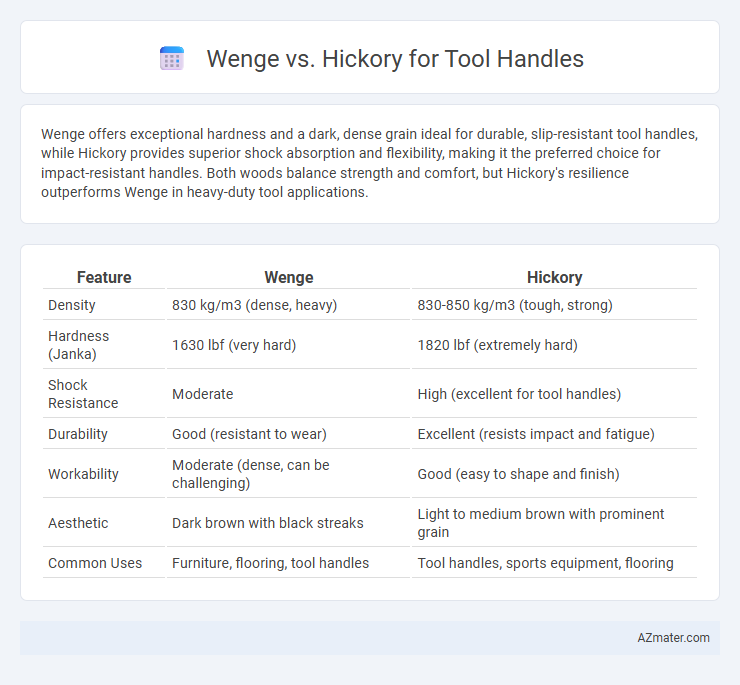Wenge offers exceptional hardness and a dark, dense grain ideal for durable, slip-resistant tool handles, while Hickory provides superior shock absorption and flexibility, making it the preferred choice for impact-resistant handles. Both woods balance strength and comfort, but Hickory's resilience outperforms Wenge in heavy-duty tool applications.
Table of Comparison
| Feature | Wenge | Hickory |
|---|---|---|
| Density | 830 kg/m3 (dense, heavy) | 830-850 kg/m3 (tough, strong) |
| Hardness (Janka) | 1630 lbf (very hard) | 1820 lbf (extremely hard) |
| Shock Resistance | Moderate | High (excellent for tool handles) |
| Durability | Good (resistant to wear) | Excellent (resists impact and fatigue) |
| Workability | Moderate (dense, can be challenging) | Good (easy to shape and finish) |
| Aesthetic | Dark brown with black streaks | Light to medium brown with prominent grain |
| Common Uses | Furniture, flooring, tool handles | Tool handles, sports equipment, flooring |
Introduction to Wenge and Hickory Wood
Wenge wood, prized for its deep chocolate-brown color and exceptional hardness, offers remarkable wear resistance ideal for durable tool handles. Hickory, renowned for its superior shock absorption and tensile strength, is a traditional choice that provides excellent grip and resilience during heavy use. Comparing these two, Wenge provides a more luxurious, dense option, while Hickory excels in impact resistance and flexibility for ergonomic tool performance.
Origin and Availability
Wenge, sourced primarily from Central Africa, is a dense hardwood known for its dark color and durability, but its availability is limited due to logging restrictions and export regulations. Hickory, native to North America, offers excellent shock resistance and impact strength, making it widely accessible and popular for tool handles in the United States and Canada. The abundant supply of hickory ensures consistent quality and cost-effectiveness compared to the more exotic and harder-to-source wenge.
Strength and Durability Comparison
Wenge offers exceptional strength and durability due to its dense, coarse grain structure, making it highly resistant to impact and wear, ideal for heavy-duty tool handles. Hickory, renowned for its toughness and shock resistance, provides superior flexibility and absorbs shock effectively, reducing handle breakage under stress. While both woods are strong, Wenge's hardness gives it an edge in long-term durability, whereas Hickory excels in handling repetitive impacts without splintering.
Shock Resistance and Flexibility
Wenge offers excellent shock resistance due to its dense, hardwood structure, making it ideal for tool handles that require durability under heavy use. Hickory, renowned for its superior flexibility and impact absorption, provides a balanced combination of strength and resilience, reducing user fatigue during prolonged tasks. Choosing between Wenge and Hickory depends on whether maximum shock resistance or greater flexibility is prioritized for specific tool applications.
Weight and Balance Considerations
Wenge wood offers a dense, heavy composition ideal for tool handles requiring substantial weight, enhancing stability during use. Hickory, known for its lighter weight and superior shock absorption, provides better balance and maneuverability for prolonged tasks. Choosing between Wenge and Hickory hinges on prioritizing either the heft and durability of Wenge or the lighter, balanced feel and resilience of Hickory handles.
Grip and Comfort in Use
Wenge offers a dense, smooth surface with natural oils that enhance grip and reduce hand fatigue, making it ideal for prolonged tool use. Hickory provides excellent shock absorption and a slightly textured grain that ensures a secure hold even in sweaty or wet conditions. Both woods deliver durability, but Wenge's ergonomic feel favors precision tasks, while Hickory excels in power-intensive applications.
Workability and Machining
Wenge offers excellent workability with its dense, straight grain, making it ideal for precise machining and smooth finishes on tool handles. Hickory, known for its toughness and shock resistance, machines well but requires careful handling due to its interlocked grain that can cause tear-out. Both woods provide durable handles, but Wenge's fine texture allows for cleaner cuts and detailed shaping compared to the more fibrous Hickory.
Resistance to Moisture and Decay
Wenge wood exhibits superior resistance to moisture and decay compared to Hickory, making it an excellent choice for tool handles exposed to humid or wet conditions. Its dense, oily grain structure naturally repels water and inhibits fungal growth, enhancing durability and longevity. Hickory, while tough and shock-resistant, tends to absorb moisture more readily, increasing its susceptibility to rot and requiring more frequent maintenance to prevent decay.
Price and Cost Effectiveness
Wenge offers a higher price point due to its exotic status and dense grain, making it a premium choice for tool handles demanding durability and unique aesthetics. Hickory, more affordable and widely available, provides excellent cost-effectiveness with its superior shock resistance and toughness, often preferred for heavy-duty tool handles. When balancing initial investment and long-term durability, hickory generally delivers better overall value for users requiring robust performance without premium pricing.
Which Wood is Best for Tool Handles?
Wenge wood offers exceptional hardness and resistance to wear, making it highly durable for heavy-duty tool handles subject to frequent impact. Hickory is renowned for its outstanding shock absorption and toughness, providing superior comfort and reduced hand fatigue during prolonged use. For tool handles requiring maximum resilience and ergonomic performance, hickory typically outperforms wenge due to its balanced strength and flexibility.

Infographic: Wenge vs Hickory for Tool Handle
 azmater.com
azmater.com